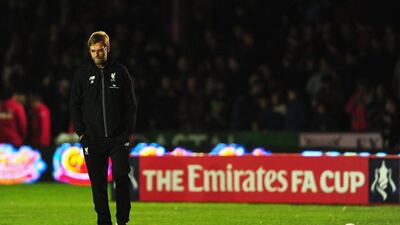Marco Reus, Mats Hummels, Ilkay Gundogan … when Liverpool appointed Jurgen Klopp, it permitted their fans to salivate about the prospect of Borussia Dortmund's greatest talents arriving at Anfield.
The gulf between great aims and a more mundane reality has been a recurring theme at Liverpool for many a year.
Never greater, seemingly, than when news emerged on Tuesday of Klopp’s centre-back target: not the World Cup winner Hummels, but the relegation specialist Steven Caulker, who turned in an appalling performance against Liverpool when they won 6-1 at Southampton.
Read more: Dele Alli signs new contract at Tottenham; Liverpool target QPR's Steven Caulker
Yet the move for Caulker, a past target of former manager Brendan Rodgers, is the product of extraordinary circumstances.
It has to be placed in the context of Klopp’s baptism of fire in England, when a crowded fixture list has been compounded by almost unprecedented injury problems.
If 13 were sidelined, and others rested, for Friday's FA Cup draw with Exeter City, the probability is that the absentees for Wednesday night's game against Arsenal will number at least eight.
There has been a backdrop of debate if Klopp’s training methods or high-energy, gegenpressing style of football has rendered so many of his players hamstrung.
The reality is that other injuries – knee problems in particular – are also a significant factor.
Yet while Jordon Ibe, Jordan Henderson and James Milner should be fit, and Mamadou Sakho could be, the consequence is still that Liverpool enter a defining week, where they face Arsenal and Manchester United, severely weakened.
Klopp’s team have been inconsistent in the extreme in his three-month reign, veering from displays of barnstorming brilliance at Chelsea and Manchester City to utterly abject displays against Watford, West Ham United and Newcastle United.
The most encouraging element is that Liverpool have been at their best when the spotlight has shone brightest.
It has suggested Klopp is a big-game manager, who is capable of calibrating his tactics perfectly for the major occasions.
Liverpool have excelled at Stamford Bridge and the Etihad Stadium. They won the first leg of their League Cup semi-final at Stoke City last week.
They ran riot at St Mary’s against Southampton, where a tougher test had been anticipated. The common denominator is that each was away from home.
Read more: 'Legs are fine' for Arsenal as they face ravaged Liverpool + Premier League kick-off times UAE
Arguably – and some may dispute this in the case of the Stoke and Southampton games – they were outsiders on each occasion.
Anfield is yet to witness a truly outstanding performance under Klopp. It does not feel a coincidence. Roberto Firmino has only scored once but has flourished as a false nine on the road. He has not at home.
Anfield matches seem to call for a more conventional centre-forward, but the fact that Christian Benteke started in an otherwise depleted team at Exeter would suggest he is bound for the bench again on Wednesday night.
A criticism of Rodgers was that he crowbarred midfielders into his team in all sorts of unsuitable positions. Now Klopp, albeit when his decisions are complicated by injuries, could inadvertently copy his predecessor.
Strikers Daniel Sturridge, Danny Ings and Divock Origi are out. So are centre-backs Dejan Lovren and Martin Skrtel. Should Sakho join them in the stands, midfielder Lucas will be deployed in the middle of the defence.
He improvised manfully in an unfamiliar role at Stoke alongside an ageing and injury-prone Kolo Toure.
For title-chasing Arsenal and under-pressure United alike, Liverpool’s injuries present an opportunity.
sports@thenational.ae
Follow us on Twitter @NatSportUAE
Like us on Facebook at facebook.com/TheNationalSport


